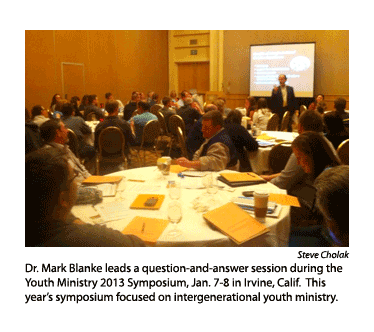Every congregation’s makeup is multigenerational, by nature. But, what they may not be — and should look at how they can be — is intergenerational in their activities, including youth ministry.
That was the bottom-line message of the two speakers — Dr. Christine Ross and Dr. Holly Allen — for the “Youth Ministry 2013” (YM 13) Symposium, Jan. 7-8 at the Hyatt Regency Hotel in Irvine, Calif. Involving 61 participants — mostly pastors, directors of Christian education and teachers — the annual symposium sponsored by the Synod’s Office of National Mission (ONM) — Youth Ministry this year focused on intergenerational youth ministry.
Ross directs the director of Christian education (DCE) program at Concordia University, Irvine, and Allen teaches child and family ministry at John Brown University in Siloam Springs, Ark. They co-authored the book Intergenerational Christian Formation: Bringing the Whole Church Together in Ministry, Community and Worship, published last fall by InterVarsity Press.
The Rev. Dr. Terry Dittmer, director of ONM Youth Ministry, wrote to Reporter that Ross and Allen noted that, applied to congregations, ” ‘multigenerational’ means that churches all have a range of people covering ages and generations. ‘Intergenerational’ means they are intentional about making sure those generations mix.”
Dittmer added that the symposium followed such an intergenerational mix by seating “Boomers, Gen X’ers and Millennials” at each table.
Why intergenerational?
“In their book,” Dittmer said, “[Ross and Allen] note that children need frequent, regular, ongoing opportunities with people of faith ‘who struggle, who trust God, who make mistakes and are forgiven, who work for mercy and justice, who model kingdom values.’ ”
He said that the speakers also noted recent research from the Fuller Youth Ministry Institute indicating that “high school and college students who experience more intergenerational worship tend to have higher faith maturity.
“At the same time,” according to Dittmer, the two authors “lamented that congregations too often segregate children, youth and adults from each other. Research indicates that the generations appreciate the opportunity to mix it up.”
The symposium theme was “Mix It Up.”
Ross summarized why intergenerational youth ministry is important. “Young adults are more likely to feel comfortable in a congregation if they have experienced positive relationships with adult members of the church during their youth,” she indicated. “Intergenerational relationships support youth faith maturation by providing youth with many adult role models, opportunities to share their gifts with adults and children, and more opportunities to have conversations with people at various places of the faith community.”
Dr. Mark Blanke — director of the DCE program, the Strategic Planning and University Institutes, and the Institute for Religious Education at Concordia University, Nebraska — provided a response at the symposium to the material presented by Ross and Allen and facilitated conversation for its practical application.
Dittmer wrote that the symposium “provides a mostly professional youth-ministry audience with the opportunity to grapple with youth-ministry issues. [It] looks to present what is timely and on the cutting edge.
“What Drs. Ross and Allen are doing is suggesting a re-energizing of a totally biblical concept of all God’s people together — children, youth, young adults, middle age, older adults and the very old — where the generations know each others’ names, enjoy time with each other, share their lives and worship together.
“There is more and more evidence that it takes a congregation to raise a child and sustain an adult,” Dittmer concluded.
Posted Jan. 17, 2013

